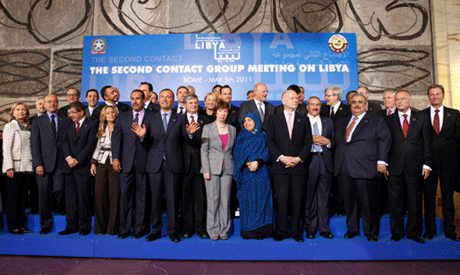
Italy's Foreign Minister Franco Frattini (front, 6th L) raises his hands during a group photo session with attendees of a meeting on Libya (Photo: AP)
An international meeting on Libya agreed Thursday on a new fund to aid Libya's rebels, with the US and Europe promising to tap frozen assets of Muammar Gaddafi's regime despite still unresolved legal issues.
The fund will initially receive donations and loans from the international community, while the assets -- estimated at 30 billion dollars (20 billion euros) for the US alone -- will be used to finance it at a later date.
France and Italy will take turns managing the fund and French Foreign Minister Alain Juppe said the new body could be up and running "within weeks" but added that the unblocking of assets "poses legal problems."
Italian Foreign Minister Franco Frattini said 250 million dollars (170 million euros) were already available -- far less than the figure of up to three billion dollars in desperately-needed credit wanted by the rebels.
Britain meanwhile ruled out any contribution to the fund from its own pocket, with a spokesman for British Prime Minister David Cameron saying: "We think we have made a very substantial contribution to humanitarian assistance."
Frattini said that the unblocking of assets was a "very serious problem." He said Italy and France had urged the European Union "to seek a solution," adding: "That money belongs to the Libyan people."
Clinton said the United States had "decided to pursue legislation that would enable the US to tap some portion of those assets." The EU and US have reportedly frozen a total of around $60 billion (40 billion euros) in Libyan overseas bank accounts and investments.
"The United States is also working to facilitate oil sales by the opposition," Clinton said, adding that the Treasury had recently removed legal barriers that have prevented oil-related transactions from aiding the rebels.
She also promised 53 million dollars in aid for the opposition and said the international community must further isolate Gaddafi's regime by refusing to accept the Libyan leader's envoys and expelling all diplomats loyal to him.
Kuwait also pledged $180 million for a fund to help cash-strapped Libyan rebels, while Qatar is putting in $400-500 million, Qatari Prime Minister Hammad bin Jassim al-Thani said during the meeting
Also on Thursday Britain expelled two Libyan diplomats for activities "contrary to the interests of the UK" after sending away the ambassador.
Clinton was on her first foreign trip since US commandos killed Al-Qaeda chief Osama bin Laden, sparking fears of retaliation by militants.
There was tight security at the meeting, which brought together representatives of 22 countries and six international organisations including NATO chief Anders Fogh Rasmussen and EU foreign policy chief Catherine Ashton.
It was the second time the International Contact Group for Libya gets together after it held its inaugural meeting in Qatar. Participants agreed to hold their next get-together in the United Arab Emirates in June.
Turkey called for a seven-day timeline within which to negotiate a ceasefire in Libya, Frattini said, but there were few details from the meeting on how that could happen or on any diplomatic solution.
The Contact Group, which includes all the countries participating in the NATO-led campaign targeting Kadhafi's regime, is taking place amid stalemate in a conflict that has already killed 10,000 people according to rebels.
The humanitarian situation is also worsening, particularly in the rebel-held hotspots of the Western Mountain region and the besieged city of Missrata.
Speaking ahead of the talks, Juppe said he hoped the conflict would not last "more than a few weeks, at the most months."
But a spokesman for the opposition's National Transitional Council said it was "a question of weeks, not months."
"Gaddafihas a lot of money and mercenaries but he controls the same areas as in the first weeks of the conflict. His days are numbered," he said.
The head of the council, Mahmud Jibril, was also there and rebel officials said that Denmark, the Netherlands and Spain had agreed to recognise their authority -- following the example of France, Italy, Qatar and Gambia. But Denmark, the Netherlands and Spain all later denied formal recognition.
Short link: